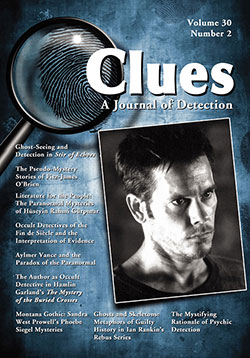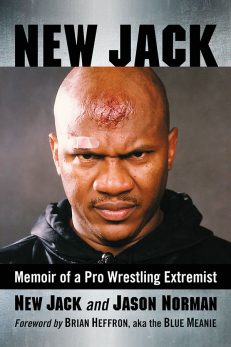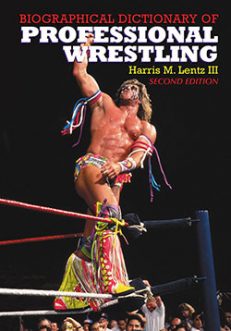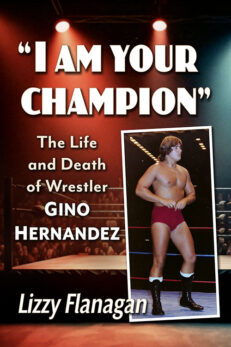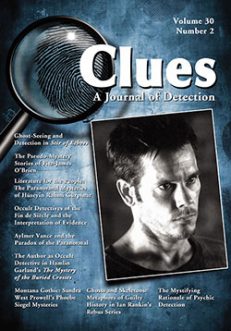Clues: A Journal of Detection, Vol. 30, No. 2 (Fall 2012)
Print Back Issue$30.00
In stock
About the Book
BACK ISSUE
This is a single back issue only. To order a current subscription, or for more information, please visit the journal’s web page at CluesJournal.com. Back issues from earlier volumes of Clues are available for order subject to availability. Also, single issues of the current volume may be ordered one at a time. Individuals may order back issues directly from our online catalog, and the charge for individuals is $30 (excluding postage). Issues from Volume 33 to the present are also available in ebook format on Kindle, Nook and Google Play.
The charge for single issues for institutions is $75 per issue (excluding postage). If your institution requires a back issue, please contact us to order at the appropriate rate.
About the Author(s)
Bibliographic Details
Executive Editor Janice M. Allan
Managing Editor Elizabeth Foxwell
Consulting Editor Margaret Kinsman
Format: softcover (7 x 10), back issue
Pages: 124
Bibliographic Info:
Copyright Date: 2012
ISSN 0742-4248
Imprint: McFarland
Table of Contents
Theme Issue : Paranormal Mysteries
Guest Editor: A. B. Emrys
Farewell, Thank You, and Welcome
Janice M. Allan 4
The executive editor of Clues thanks Jim Mancall for his service as Clues book review editor and welcomes Pamela Bedore as the new book review editor.
Introduction: From Psychical Investigation to Paranormal Detective
A. B. Emrys 5
The guest editor of this Clues theme issue on paranormal mysteries introduces the issue, outlining the themes of the contributor essays and mentioning authors such as Alice and Claude Askew, Wilkie Collins, Arthur Conan Doyle, Hamlin Garland, Hüseyin Rhmi Gürpinar, Fitz-James O’Brien, Sandra West Prowell, and Ian Rankin.
What Are They? The Pseudo-Mystery Stories of Fitz-James O’Brien
Pete Orford 10
The works of Fitz-James O’Brien are largely forgotten. The author considers how two of O’Brien’s works resemble early detective fiction and assesses how the stories’ hero, Harry Escott, both conforms to and subverts the figure of the detective as presented by the bookending icons of C. Auguste Dupin and Sherlock Holmes.
Literature for the People: The Paranormal Mysteries of Hüseyin Rahmi Gürpınar
Özgür Çiçek and Irmak Ertuna-Howison 19
The authors examine Hüseyin Rahmi Gürpınar’s paranormal mysteries in the context of the modernization of the late Ottoman Empire. His popular style, distinctive from other Westernizing movements at the time, as well as his incorporation of traditional narrative techniques, reveal how Gürpınar hybridizes the Western genre of paranormal mystery in early Turkish literature.
CSY: Occult Detectives of the Fin de Siècle and the Interpretation of Evidence
Sarah Crofton 29
Early occult-detective fiction aped the familiar detective formula, playfully substituting its basis in criminalistics for psychical research. In disrupting the archetype, it draws attention to a gap traditionally elided in detective fiction but at the heart of occultism: that between proof in its absolute sense and the persuasive proof of a convincing story.
Aylmer Vance and the Paradox of the Paranormal
Oliver Tearle 40
How can the ever-mysterious world of the supernatural be successfully joined with the detective story, a genre that thrives on tying up loose ends in the narrative? Through a comparison of some of the best-known fictional psychical detectives and investigators, the author seeks to explore the important issues surrounding this hybrid genre.
Beyond the Border: The Author as Occult Detective in Hamlin Garland’s The Mystery of the Buried Crosses
Tim Prchal 49
Occult detectives probe fictional mysteries rooted in the supernatural. In The Mystery of the Buried Crosses (1939), Hamlin Garland recounts his investigation into a real-life mystery involving spiritualism. Like the fictional detectives, Garland urges readers to ponder the borders of their physical world but offers no definitive stance on supernatural intrusions.
Montana Gothic: Sandra West Prowell’s Phoebe Siegel Mysteries
Rachel Schaffer 60
Montana author Sandra West Prowell blends gothic and paranormal elements, including mysterious mansions, ghostly sightings, and prophetic dreams, as she examines issues of social justice, particularly for women and Native Americans, and highlights Native American spirituality, all from the irreverent point of view of private investigator Phoebe Siegel.
Ghosts and Skeletons: Metaphors of Guilty History in Ian Rankin’s Rebus Series
Erin E. MacDonald 67
The author examines Ian Rankin’s use of the gothic convention of the ghost in Black and Blue, Dead Souls, Set in Darkness, and “The Very Last Drop.” In these works, ghosts and skeletons are used as metaphors for Detective Inspector John Rebus’s guilt over past mistakes and for the dark past of his home city, Edinburgh.
Ghost-Seeing and Detection in Stir of Echoes
Murray Leeder 76
The author explores the links between the ghost story and the classical detective story, using as a case study the 1999 film adaptation of Richard Matheson’s Stir of Echoes (1959). The author explores the relationship of the restless dead to the living as well as the investment of the detective with powers to see a secret world hidden from everyday human vision.
The Mystifying Rationale of Psychic Detection
Eden Leone 89
Through an examination of the USA Network series Psych (2006–), the author discusses how the psychic detective subverts the model of rational detection as exemplified by Sherlock Holmes.
ESSAY
Homicide and Home-icide: Exhuming Ireland’s Past in the Detective Novels of Tana French
Shirley Peterson 97
Tana French’s Dublin Murder Squad series features police procedurals in which homicide investigations act as a social critique of “home-cide” in the “new” Ireland spawned by the economic boom known as the Celtic Tiger. Dublin is a crime scene in which victims of its inconvenient past refuse to stay buried until justice is served.
BOOK REVIEWS
Stephen Knight. The Mysteries of the Cities: Urban Crime Fiction in the Nineteenth Century. Daniel Stein 109
Christine A. Jackson. The Tell-Tale Art: Poe in Modern Popular Culture and Paul Meehan. Horror Noir: Where Cinema’s Dark Sisters Meet. Jim Mancall 111
A Land Down Under: Recent Crime Fiction and Nonfiction from Australia. Stephen Knight 115
Clues Index, Volume 30 119
Author Guidelines are on page 124
Book Reviews & Awards
- “Clues is a must-have for readers and writers of crime fiction. Scholarly, thought-provoking, wide-ranging in its topics, Clues covers the crime and thriller map.”—Sara Paretsky
- “A. Conan Doyle, notoriously resentful of Sherlock Holmes’s success, liked to scorn ‘police romances’ as less significant and worthy of his talents than his other literary work. If he could have read Clues, the thinking mystery reader’s journal, he would surely have felt differently—and learned much he never realized himself about even his own landmark contribution to the genre, from which so much else by others has flowed.”—Jon Lellenberg, U.S. agent for the Arthur Conan Doyle estate
- “I love reading Clues. Every issue provides thought-provoking, well-researched articles. The variety and scope of the material found in Clues makes an unparalleled, ongoing contribution to our understanding of the role of crime fiction in our culture, and the genre’s reflection of its time and society.”—Jan Burke, Edgar-winning author of The Messenger (2009)
- “Clues is an important journal. It carries the torch of tradition that is the backbone of detective fiction. It goes below the surface and gets to the heart of what makes the genre so fascinating and valid today”—Michael Connelly, author of the Harry Bosch novels, including The Overlook (2007)
- “for erudite and fascinating truths about mysteries, follow the clues to Clues, the scholarly journal that is an essential resource for every serious student of the mystery”—Carolyn Hart, author of Death Walked In (2008)
- “with scholarship ranging from Poe to Peters, nothing beats Clues”—Joan Hess, author of Mummy Dearest (2008).

